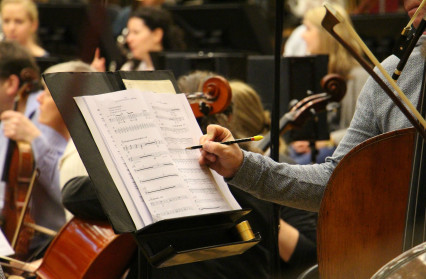Steph Power discusses the BBC NOW Composition: Wales event at the Wales Millennium Centre in Cardiff where new composers submit their work.
“Why write for the orchestra? For one thing, it’s a very challenging problem.”
Elliott Carter, composer (1908 – 2012)
“We must not forget that if we don’t do these projects, in five years time we will all be playing the same. So let’s keep doing this, let’s keep challenging our young generation artists.”
Jac van Steen, conductor, BBC NOW Composition: Wales
The symphony orchestra has proved a remarkably resilient cultural institution. Having survived political and artistic turmoil in the 20th century, it has fended off charges of social and musical anachronism in the 21st to enjoy a surge of interest amongst composers of all kinds. Generally, composers seem far less bothered by its supposed weight of historical baggage than some were a generation or so ago. When Elliott Carter was asked as the new millennium approached why write for the orchestra, the very question implied doubts concerning its suitability for a new democratic and technology-driven age. Yet – quite apart from the eye-opening post-Soviet emergence of symphonists from the former Eastern bloc – swathes of composers from Ligeti to Rădulescu, Saariaho to Murail, Richard Ayres to Richard Barrett have belied the myth that orchestral music by its nature lacks contemporary cultural bite.
Writing for orchestra is one of the biggest, most potentially exhilarating challenges a composer can rise to. But the challenge for orchestras everywhere – assuming they care about contemporary music, which not all do, despite wider cultural imperatives – is how to encourage emerging composers while their core audience remains suspicious of anything beyond a narrow canon of perceived ‘greats’ from the past. A handful of tonally based composers may cautiously be said to have entered the repertoire, or at least achieved mainstream recognition (Glass, Pärt and John Adams spring to mind). Regrettably, the same cannot be said for those of a modernist or more experimental bent – and this despite a welcome general breaking down of barriers between so-called art and vernacular musics, helped by film and TV.
Filling concert halls has never been more critical for orchestras than in today’s arts-phobic political and economic climate. But neither has the need to renew the lifeblood of the orchestra in terms of repertoire and audience diversity. Seizing opportunities to build on current enthusiasms for large-scale collective music-making seems a no-brainer all round – and that is precisely what a unique project at the BBC National Orchestra of Wales seeks to do.
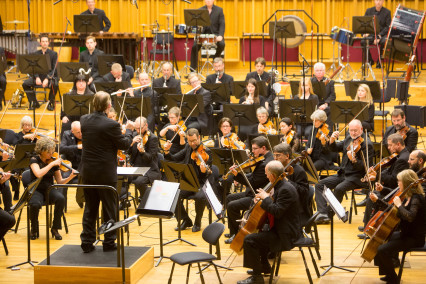
Composition: Wales is organised by a team working under Suzanne Hay, BBC NOW Head of Partnerships and Learning, and has run annually since 2010 in association with Composers of Wales, Tŷ Cerdd and the Welsh Music Guild. It’s a scheme whereby composers born or living in Wales are invited to submit scores for workshop and potential concert performance by the BBC NOW under its indefatigable former Principal Guest Conductor, Jac van Steen. Each year, up to seven short pieces are selected from those submitted, and their composers are invited to attend intensive sessions at BBC Hoddinott Hall.
Standards have risen over the years and are now gratifyingly high, with selections for the final evening concert limited only by rehearsal time relative to the technical difficulty of the score at hand. This April, five of the seven pieces were performed, by composers Lewis Furber, Harriet Grainger, Martin Humphries, Carol J. Jones and Lenny Sayers. The further two workshopped scores were by David Roche and Jason Savory. Each piece had much to recommend it, and together they showcased a range of styles and orchestral thinking by composers who clearly have promising futures.
This year, every selected composer happened to be either a current or recent composition student, or a professional musician (with links to institutions including the Royal Welsh College of Music and Drama, University of Cardiff and BBC NOW itself in the form of its Principal Bass Clarinet, Lenny Sayers). But Hay is keen to stress that,
‘the scheme is open to people of all ages. Obviously, we often have submissions from student composers, but we’ve had some from people who have come to composition much later in life; who’ve maybe been fascinated with the whole concept of composing but have only started writing more recently. We had somebody involved in the scheme that had actually started writing after retirement.’
Crucially, all the sessions are open to members of the public and are free to attend, including the evening performance. Thanks to the efforts of BBC NOW librarians Eugene Monteith and Christopher Painter (himself a fine composer), copies of the scores are available to peruse throughout. That anyone with an interest in the workings of the orchestra, let alone in contemporary music, might find the whole process fascinating is evidenced by Mr Bowen, a BBC NOW subscriber:
‘I wouldn’t miss it for anything. I’ve got no deep background in music, I can’t read a score. I couldn’t stand modern music ten years ago but now, if there isn’t 20th century music in the concert I’m not happy. You think, where the hell did that sound come from, which instrument? I don’t want to analyse things and be told about it as if it’s a story – music’s a language of its own. It’s the sounds.’
Job done, you might think. And yet there are many classical music lovers who, whilst happy to read contemporary novels or look at contemporary visual art, feel that listening to modern music is somehow a step too far into the unknown.
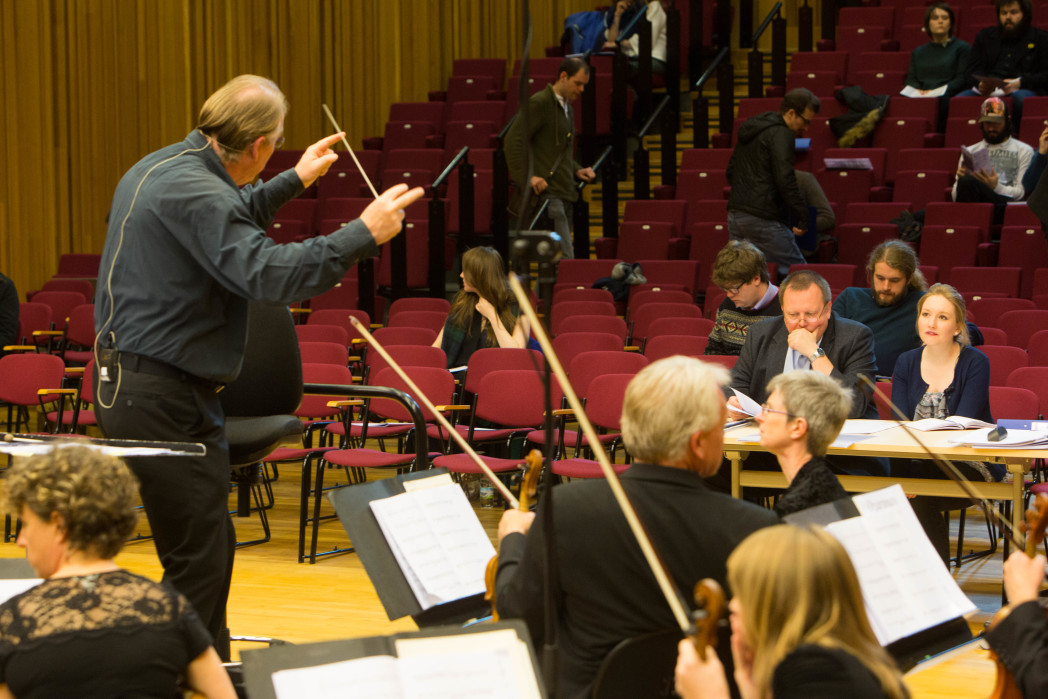
Of course all creative artists must step into the unknown if they wish to grow – and, indeed, to discover what it is they might want to express in the first place. If the experience for the audience at these BBC NOW events is rewarding, for the composers it is invaluable; there is no substitute for hearing one’s music played by top professionals. During the workshops, irrespective of style or idiom, each score is subjected to detailed scrutiny by van Steen and the orchestra, together with two professional composers. This year, it was the turn of BBC NOW former and current Composers-in-Association, B. Tommy Andersson and Huw Watkins, to sit with the composers while their scores were deconstructed with great care, section by section. Both composers are also performers: Watkins is a world-class pianist, whilst Andersson is a former orchestral player who drew on his extensive experience as a conductor to ‘find the bridge between those worlds and try to explain them to the composers’, as he put it.
Led by van Steen, everyone in the team – including the musicians of course – can chip in with comments, questions or advice. The idea is to focus on and hopefully improve areas where the composer’s intentions are unclear or their writing impractical; where the orchestral colours are muddy, say, or the balance not working; where their notation is wrong or misleading – or where the composer has written instrumental parts which are impossible to play; in short, anything that prevents the music being communicable to the players and conductor, and thence to the audience. As van Steen pointed out of his virtuoso colleagues, ‘if this orchestra can’t play it, there’s something wrong.’
This year, day two began with an illuminating session on the relationship of colour to texture and line in orchestral writing, particularly regarding the strings. Van Steen and the musicians dissected extracts from works by Ravel, Bartók and Mahler in order to demonstrate how, for instance, dividing the violins can affect the way we hear harmonies, or how low strings can be used to support low woodwind sonorities; all part of what he called ‘the psychology of orchestration’. On the morning of day three, in a supplementary project, students from Bangor University had pieces for wind quintet workshopped by members of the orchestra in the Grace Williams Studio, following an earlier visit to Bangor by BBC NOW: this, too, was free and open to the public.
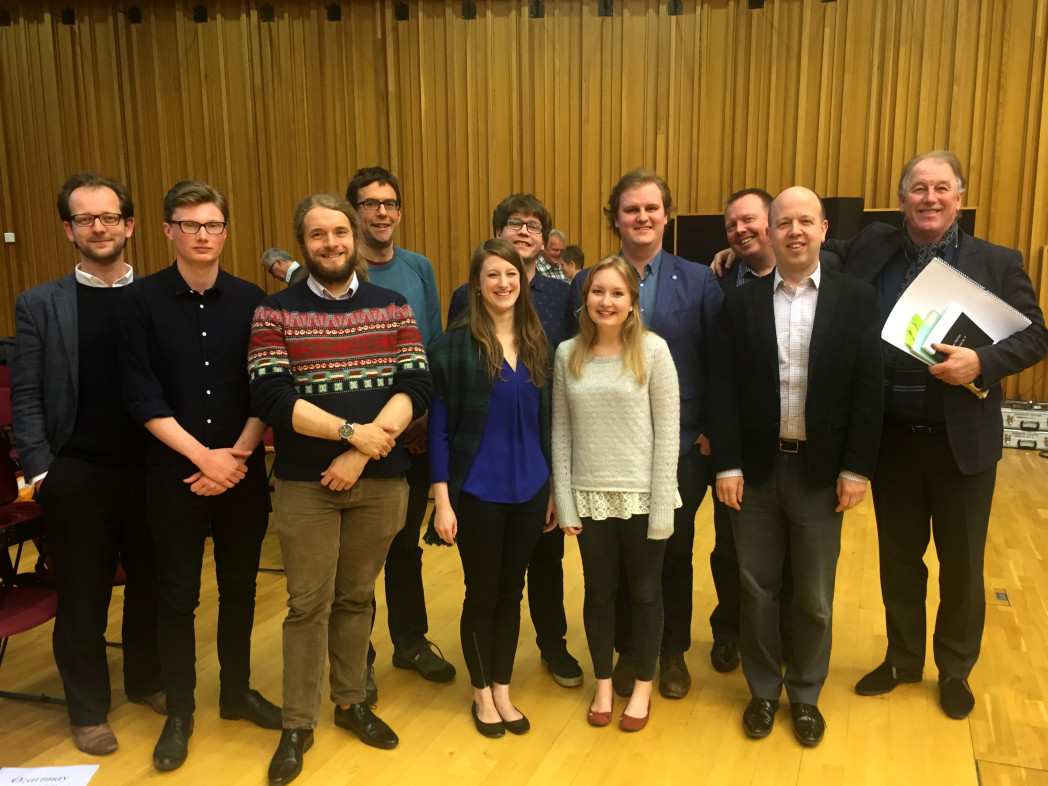
For Andersson, one of Composition: Wales’s unique attributes is the time gap between the first and second workshops. In 2016 that gave the selected composers two months between February (day one, led by conductor Frank Zielhorst) and April (days two and three) to edit or amend their scores. As he explained,
‘All of them have done that, taken the opportunity to improve on their pieces. I think that’s a very good way to work because it’s so easy to let first impressions decide, and then you say, oh no, this is not a good piece. But it might be that simple things could be corrected.’
Not only that, but each composer was given a recording of the February session to work from. Andersson again:
‘I remember myself how it was to be a young composer, being so overwhelmed by the impressions from having your music played that you can’t really sort what you are hearing from what you expect to hear. There’s so much to take in, so you need this opportunity to go back and listen to what really happened. What did the musicians actually do, how did it really sound? And that’s the best sort of platform to start from for improvement.’
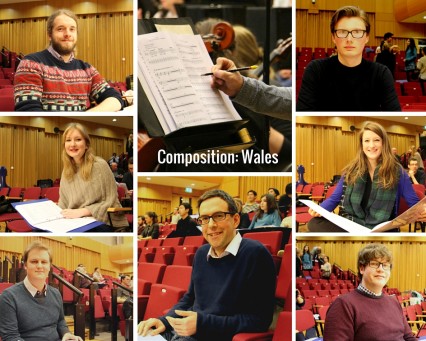
Clearly, there is a tremendous amount on offer here for composers and listeners alike, and the project continues to grow in stature. But what of the seven composers selected in 2016? Most had never written for orchestra before, and all expressed delight at the realisation – sometimes transformation – of their piece through the process. Each spoke of particular areas where they had benefitted: for clarinettist Lenny Sayers, stepping out of the BBC NOW woodwind section as a composer was ‘one of the most nerve-wracking things I’ve done since joining the orchestra’ some four-and-a-half years ago. However it proved a massive confidence boost and enabled him to ‘appreciate how my colleagues work a little bit more as well learning more about the instruments and their abilities.’ Brass and woodwind specialist Martin Humphries found ‘Jac’s session about string writing was fascinating and really useful’, whilst for Lewis Furber, ‘I was quite worried that [Westminster Dances] would come across as too much of a joke.’ And so he was especially pleased to find its dark underbelly seized and understood.
David Roche pointed out that ‘writing for orchestra, the sheer volume of work is huge – just calculating how much you have to do per day to meet the deadline is quite intimidating.’ For him, the key point was ‘really considering the ensemble you’re writing for and really paying attention to that. That’s something I’ll definitely take away from this.’ That latter issue crops up in different forms for mainly digital film and TV composers; a specialism of Jason Savory. He relished the chance to play with the fine acoustic in BBC Hoddinott Hall, since ‘a film composer’s medium is dense and intricate, but not so dynamic as the live one – it’s coming through a set of speakers.’
Harriet Grainger has recently spent time in South-East Asia, and in Estonia studying with Helena Tulve. So for her, writing for Composition: Wales was an opportunity to try out some exciting new techniques and (especially percussion) sounds. She found that, following the February workshop, she was able to double her piece in length: ‘I changed the ending and extended it. I really liked the way Jac conducted it today – it was a lot faster and I think it really worked.’
Every composer found that getting down to work soon settled their nerves. Carol J. Jones seemed to sum it up for the collective: ‘There’s that awful moment in the workshop when you walk up to the front and you see the orchestra – and then you turn round and there’s everyone else in the audience and you think, don’t worry, it won’t go wrong. Then you sit down and Jac immediately has questions about the score and you think, oh God it’s going wrong already! But I’m really enjoying it, and everyone else is having a good time as well. It’s a supportive atmosphere.’
This year’s project inevitably threw up questions and possibilities for next year’s project, as each does. Perhaps the rehearsal time could be increased so to ensure that every selected piece can be polished for performance in the final concert, regardless of difficulty. This in turn might help to encourage those wishing to experiment with more unusual or innovative colours and textures. On the other hand, submitting a score to the project provides a very useful taste of life as a professional, since it involves writing to a stated brief which includes pre-agreed rehearsals. Next year, for the first time, as well as a maximum duration of eight minutes and other stipulations, there is a stylistic brief:
‘The perfect concert opener or encore for a BBC National Orchestra of Wales concert, such as St David’s Day or an international tour.’
If that appeals, I would urge anyone considering writing for Composition: Wales 2017 not to think twice, but to do so soon. The deadline for submission of scores is Tuesday 15 November 2016 at 10am. See the BBC NOW website for further details and to download submission guidelines.
BBC National Orchestra of Wales at the BBC Hoddinott Hall, Wales Millenium Centre, Cardiff
Public workshops: 25 February, 27 & 28th April 2016
Open rehearsal: 28 April 2016
Free evening concert: 28th April 2016
Shortlisted scores:
Westminster Dances by Lewis Furber
Glasslines by Harriet Grainger
A Sovereign Hawk by Martin Humphries
Songs from the Stars – Movement 1 by Carol J. Jones
Ozartmay by David Roche
Seven Brothers by Jason Savory
Severn Blue by Lenny Sayers
The composers’ websites:
lennysayers.com Watch out for Penarth concerts with David Adams et al and more.
martin-humphries.co.uk A first commercial CD of wind orchestra music was recently released by Prima Facie (ASC).
lewisfurbercomposer.co.uk A fourth opera, Freaks, will premiere at RWCMD in June.
davidjohnroche.wordpress.com Already active as a composer in a variety of genres.
jasonsavory.co.uk Already active as a composer for film, corporate video and the concert platform.
https://soundcloud.com/harriet-grainger-composer Watch out for a forthcoming cello concerto.
caroljjones.wix.com/composer Watch out for a forthcoming recording of Lux Aeterna for chamber choir, and a new piece, Gravity, for cello and piano.


